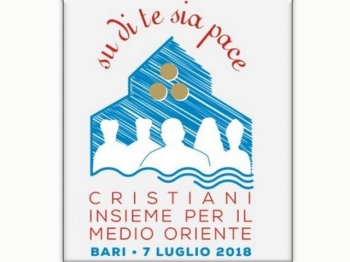An important encounter to pray for peace in the Middle East

Francis believes in prayer and believes in the divine gift of peace. Fortified by these convictions, and inspired by the Spirit, in order to invoke and mature peace in the Middle East, he has called for a prayer encounter on July 7 in Bari. An unusual meeting, singled out by the choice in location which has strong ecumenical connotations: the Basilica of Saint Nicholas.
The Pope is motivated by the need for a new and special supplication to God to begin to unravel the many, and increasingly tangled knots that encompass human affairs in that region, paradoxically the cradle of the three great monotheistic religions. This not only solicits our excitement and involvement, it also urges us to better understand the reasons for such an important decision.
The first consideration certainly involves faith in prayer. The invitation to pray from a man who ceaselessly reminds us “not to forget” to pray for him, may seem obvious. His exhortation is based on the richness of the interior life that every baptized person has the duty to cultivate by practicing the weapon of prayer, besides being nourished by the Word of God and the sacraments. So not only is he in a position to be able to adore, love and invoke God the Father in Truth but also to battle Satan who “like a roaring lion”, St. Peter reminds us (1 Pt 5,8), is bent on the destruction of our spiritual life through division among men and their removal from the immanent presence of God.
A divine intervention to open a path to peace
In the Near and Middle East this very division is manifesting itself as ever more lacerating, inappeasable in its annihilation of all signs of life, never satisfied with its total destruction, even of the smallest buds that open to hope. The images that come to us from Syria, Iraq, Afghanistan, Yemen of stray and frightened refugees, victims of suicide bombers, camps of refugees exhausted with resignation, survivors of deadly gas, buildings in rubble, skeletal palaces, churches profaned, all testify to an endemic conflict that like a monster feeds on its wickedness. And it shows no sign of stopping given the converging resources of powers, some far from the area, determined to assert their own interests, which are above all economic and strategic (even nuclear), or their own political-religious primacy. The increased rivalries between nations and peoples of the region have complicated and aggravated the persistent Israeli-Palestinian tensions.
All human power seems to have faded, given the failures of the diplomatic action and the paradoxical impotence of the military one, capable of taming the ruthless struggle for peace. Thus Pope Francis, who is passionately devoted to Mary Untier of Knots, certainly thought of her intercession in the peroration of divine intervention. The only one who can open to hope, to peace. He prepared for this with the prayer for the emblematic, beloved Syria which, on Easter Sunday, he called all Catholics to pray for; then with the pilgrimage, at the beginning of May, to the Roman Shrine of Divine Love and reiterating the invitation to recite, with this intention and throughout the month, the Holy Rosary. He then called a special prayer meeting, of all Christians, from the West and the East, inviting the Patriarchs of the Catholic and Orthodox Churches of all rites to Bari.
The Basilica of Bari, a place of ecumenical prayer facing the East
The value of Bari for this general prayer mobilization certainly lies in the fact that it is the capital of a region historically seen as the “gateway to the East” and “bridge” in the Mediterranean between continental Europe and the closest Asian coasts. The peoples have always met here, with their fruits and cultures, and through here the Christian pilgrimage for the Holy Land flowed from many parts of Europe, under the protection of the Gargano, just as in Normandy, of the Archangel Michael. But Bari is above all a witness to the anxiety and commitment of Christians for the re-establishment of their unity that has as its protagonist the holy thaumaturge Nicholas of Mira. He is highly revered in the East as in the West, his relics kept in the splendid basilica that the city has erected in his honor, a destination of pilgrimages and unique in Christianity where both Mass in the Latin rite and the Divine Liturgy in the rites of our Orthodox brothers, are celebrated.
Memory and circumstances make the July 7 meeting extraordinary in the invocation to God of the gift of peace by His children united in His name. Jesus, after having revealed to us (Jn 14: 5-6) that He is the “way, the truth and the life”, has left us this assurance, repeating it even twice (Jn 14: 13- 14): “Whatever you ask in my name, I will do it, so that the Father may be glorified in the Son. If you anything of me in my name, I will do it.”
Graziano Motta
(June 2018)



